* Spoiler Alert! This critical essay presumes the reader's familiarity with the 1956 film The Bad Seed and features major spoilers. Plot points and details related to both films are divulged for critical discussion and analysis.
Show of hands; how many of you folks out there were aware of a 1963 Turkish remake of that beloved camp classic about pigtails, penmanship, and passed-on psychopathology, The Bad Seed (1956)? That many, huh? I don't believe you.
Please appreciate, dear reader, any aspersions cast on your doubtless incontrovertible honesty is simply me projecting my absolute gobsmacked astonishment at how—after being near-obsessed with The Bad Seed for nigh on six decades—I've only just NOW discovered this movie! And it commemorating its 60th anniversary, no less.
From what little I've been able to glean, Kötü Tohum (Bad Seed) was a very popular release in its country of origin but was never given a foreign market release in the U.S. .… perhaps for copyright-related reasons (its score is comprised of music culled from disparate sources, e.g., Leonard Bernstein's "Maria" cha-cha from West Side Story and Alex North's "Unchained Melody.”) All of which would explain why I never saw it, but does absolutely nothing toward clearing up how, in all these years, I never managed to hear or read a single word about the existence of this extraordinary remake of a lifelong favorite. Indeed, had it not been for a blurry, TV-to-VHS transfer of Kötü Tohum popping up in my YouTube suggestions menu a few years back (which seems to be the only copy in circulation), I might never have seen it at all.
 |
| Nancy Kelly as Christine Penmark and Patty McCormack as Rhoda Penmark |
By way of a bit of backstory: The Bad Seed is a 1954 bestselling suspense novel by William March whose plot is built on the somewhat wobbly premise of an angel-faced 8-year-old inheriting the homicidal genes of her serial-killer grandmother. The then-explosive theme of a child committing cold-blooded murders appealed to Pulitzer Prize-winning playwright Maxwell Anderson (Key Largo, Anne of the Thousand Days), who turned March's book into a Tony Award-winning Broadway play later that year.
The sweet smell of Broadway success wafted all the way to Hollywood, and in 1956, movie director Mervyn LeRoy (Little Caesar, Gypsy) retained the services of most of the Broadway cast for the somewhat sensationalized screen adaptation. The Hays Office, Hollywood's self-regulating censorship board, mandated The Bad Seed alter its original twist ending (which saw Rhoda getting away with her crimes) to one in which Rhoda involuntarily keeps an appointment with "Heaven's Electric Chair." With a reassuring "cast curtain call," coda tacked on for good measure. The movie version of The Bad Seed was a boxoffice hit with 4 Academy Award nominations.
 |
| 1956 1963 |
The Bad Seed premiered on broadcast TV in 1962, quickly becoming a late-night movie programming staple. I saw it for the first time in 1966 when I was eight. My initial impressions: a) It was really scary, b) "Au Clair de la Lune" would forever creep me out, and c) Rhoda Penmark was my first movie monster that wasn't a vampire, werewolf, or creature from outer space.
But just as quickly—thanks to the dated artifice of its plot, its stagey over-rehearsed performances, and Patty McCormack's James-Cagney-in-a-pinafore take on Rhoda—chills were soon replaced by chuckles, and The Bad Seed morphed irretrievably into a movie I loved for its camp appeal and unintentional laughs.
Subsequent TV movie remakes (at least three, by my count) sought to rectify this, but those not hampered by their utter lack of distinction in the casting department (not just any kid with a SAG card can step into Patty McCormack's metal-cleated Mary Janes) betrayed their fundamental lack of understanding of the material by wrongheadedly trying to turn The Bad Seed into some kind of "invincible killer" franchise like The Omen or Godzilla. Instead of finding something new in the material or, at the very least, having a clue as to what made The Bad Seed work in the first place, each new iteration only confirmed and solidified The Bad Seed's already high-ranking status in the canons of camp.
I expected more of the same when I settled in to watch Kötü Tohum.
The very LAST thing I expected was to be moved to tears (!) by a sensitive, thoughtfully reimagined adaptation that remains doggedly faithful to the original (it keeps the Hollywood-mandated finale) yet strikes out on its own with an insolent daring that borders on brilliance.
In prioritizing action over exposition, human emotion over melodrama, and narrative conflict over genre-driven shock mechanisms, Kötü Tohum is an act of (little)monster regeneration rivaling anything attempted by Dr. Frankenstein.
 |
| Alev Oraloglu as Alev Caliktas - (Rhoda Penmark) |
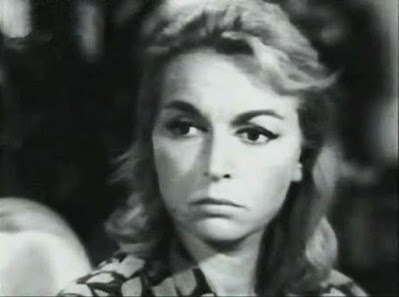 |
| Lale Oraloglu as Lale Celiktas - (Christine Penmark) |
.JPG) |
| Ozturk Serengil as Memo - (Leroy) |
 |
| Nedret Guvenc as Nuran Seren - (Mrs. Hortense Daigle) |
 |
| Levent Haskan as Cemel Seren - (Claude Daigle) |
Real-life mother and daughter Lale and Alev Oraloğlu star as the Christine and Rhoda Penmark of Kötü Tohum; their performances' relaxed, easy chemistry setting this adaptation's naturalistic tone. Both actresses reprise the roles they originated in a successful 1961 theatrical run of The Bad Seed performed at Istanbul's Oraloğlu Theater (founded in 1960 by Lale Oraloğl—an esteemed actress, director, writer, & producer…with her husband, journalist Ali Oraloğlu).
[NOTE* I'm claiming the "Old Dogs, New Tricks" rule here: The 1956 movie has been in my pop culture Rolodex for too long. For the sake of clarity (chiefly my own), I will be referring to all the characters in the remake by their names in the original movie.]
 |
| Hale Akinli as Mrs. Nevin - (Miss Fern) |
As remakes go, Kötü Tohum is a perfect example of the adage: It's not the tale; it's in the telling.
Part of the shock value of the original The Bad Seed (released when idealized images of ‘50s middle-class life flourished via TV shows like Leave It To Beaver, Father Knows Best, and The Donna Reed Show) was rooted in the distasteful notion that a child (innocence itself) from a good home and raised with all the advantages of wealth and a good neighborhood, could ever turn out to be a coldblooded killer.
The 1956 Bad Seed portends to be a “Nature vs. Nurture” debate, but there’s never really any doubt that the whitebread suburban ideal of Rhoda’s upbringing will prove blameless for what Rhoda has become. A verdict of “Nature” (she inherited her evil, end of story) restores conformist order and absolves the surviving characters from having to ask themselves what part their blinkered ignorance, pampered over-indulgence, and perfectionist values of achievement (“Oh, you like little girls to curtsy?”) played in fostering Rhoda’s psychopathy.
Kötü Tohum—directed and adapted screenplay by Nevzat Pesen—retains all the pertinent aspects of The Bad Seed's plot, but in the retelling, it looks at the insulated, elitist world of the privileged classes and sees it as EXACTLY the sort of environment where narcissism is cultivated, a lack of compassion is normalized, and rabid self-interest and the casual disregard for the humanity of others could easily go unnoticed. In such surroundings, a pint-sized sociopath would call no attention to herself.
The most startling and noteworthy of Kötü Tohum's narrative inventions is the decision to make the traditionally unseen character of Claude Daigle a major protagonist. Written (to heartbreaking effect...they even give him an impending birthday) to be the sweetest, most compassionate character in the movie, Claude's prominence in the story has a seismic impact on every aspect of the film.
Kötü Tohum has been very effectively opened up and spends a great deal of time showing us Rhoda's relationship with Claude—they're classroom seatmates, Claude harboring a bit of a puppy love crush on Rhoda that somewhat blinds him to her polite indifference. The film trims away a great deal of narrative fat (bye-bye to the Freudian mumbo-jumbo, windy true-crime debates, and endless mansplaining) and makes the bold choice to dramatize events that occur offscreen or are merely talked about in the original (we're shown the Penmanship Contest [Yay!] and we actually see the murders [Yikes!]).
The cumulative effect (and one that proves a major plus) is that Christine's emotional journey of discovery is no longer so centralized. Indeed, her big "Whose child am I?" revelation scene is introduced and dispensed with so quickly that it feels as though the director was embarrassed by the whole "My child inherited my mom's skipped-a-generation serial killer genes" gimmick.
Whatever instincts inspired Pesen's decisions in adapting the material, I must say they're exemplary. He and his talented cast have made Kötü Tohum a tighter, more cinematic, and, ultimately, for me, the most satisfying retelling of The Bad Seed.
 |
| The Bad Seed meets its match in the superb Kötü Tohum |
WHAT I LOVE ABOUT THIS FILM
My gripe with most remakes is that they're so often these totally superfluous, market-driven retreads with nothing new to add. Kötü Tohum is the only remake of The Bad Seed to attempt to use the material to say something beyond the genre scope of its premise. Every scene written by Nevzat Pesen serves double duty: 1) as a critique of classism, bourgeois society, and its tendency to prioritize its needs over the concerns of others; 2) as a means of adding complexity to the characters and context to their relationships.
The Penmanship Contest
A fascinating fabrication of this remake is seeing just how the Penmanship Contest goes down. The entire class participates, and Rhoda (seated next to Claude) is as serious as a heart attack. Disaster strikes when her pencil breaks mid-test, leading her to turn wordlessly to Claude with a "Well...?" look on her face (though previously shown as aloof to his friendly overtures, it’s clear she’s not above exploiting his crush when she wants something).
Claude obliges by giving her his pencil (no “Thank you” from Rhoda), and while she resumes the contest, he sharpens the pencil and returns to his own paper. The director inserts a shot of their teacher catching sight of this act of gallantry, offering the tantalizing suggestion that Claude’s humanist values (prioritizing kindness over winning) may have also played a part in his ultimately winning the contest.
The School Pageant
To be found in no other existing version of The Bad Seed is this marvelous school recital sequence held a few days after the Penmanship Contest. As the scene opens, Claude is shown dancing a vigorous twist onstage while Rhoda glowers at him from the wings. In the audience, the beaming Daigles sit within unfortunate earshot of Rhoda's mother and the two snobbish landladies; the latter commenting rudely on what an egregious error it was to have awarded the medal to anyone but Rhoda.
Rhoda soon appears onstage in a meta, art-reflects-Iife number that sees a host of little girls dancing in tutus having their frolic brought to an abrupt halt by the intrusion of Rhoda brandishing a rifle (!). Understandably, the toe dancers scatter, leaving Rhoda (apparently playing a shepherd) with the stage all to herself, going solo. As she does every day in the school playground.
The Flashback
One of the principal virtues of Kötü Tohum is that it feels like a thriller made by a director who hasn't learned the clichés of the genre. As evidenced in the flashback sequence devised to accompany Rhoda's confession to her mother that she killed Claude at the picnic for the Penmanship Medal. Though an emotionally harrowing sequence, it's not written with any of the melodrama one would expect. The remake stays true to the characters' psychology, so instead of having Rhoda single-mindedly stalk Claude around the picnic grounds like Bruce the Shark in Jaws, Kötü Tohum introduces a note of tragic poignancy. It's Cladue who pursues.
True to form, Rhoda is off to herself at the picnic, brooding while the other children play. Claude deserts his friends to check on Rhoda, who, in a repeat of her "willingness to exploit a vulnerability" behavior during the contest, informs Claude that she’s going off by herself to the lake, making sure to drop the bomb “You can come if you want to” as she departs. Poor lovestruck Claude follows, his doom truly sealed when Rhoda takes his hand in her first and only display of friendliness towards him.
 |
| "What will you give me for a basket of kisses?" |
THE STUFF OF DREAMS
The general mindset of American pop culture is that the darker or more hopeless something is, the more inherently "real" or true-to-life it must be. Happy endings, or conclusions where justice is meted out, are seen as pure Hollywood copouts.
I'm unaware of 1963 Turkish cinema being bound by any of the censorship constraints of Hollywood, 1956, so the decision to retain The Bad Seed's Hollywood ending over the play's original twist (ironic, cynical) ending is perhaps surprising, but it's also consistent; Kötü Tohum is a very moral movie.
 |
| Where The Bad Seed often emphasized shock and melodrama, Kötü Tohum just broke my heart in the way it gave prominence to the pain of grief and loss. The actors in this film are first-rate. |
Indeed, Kötü Tohum's prime distinguishing trait is its humanist perspective. Through its expansion and centralizing of the Claude Daigle character (representing the virtues of decency, kindness, and compassion), I felt the film established the crucial elements of its moral universe. To end on a note of irony or "twist" for the sake of an audience gasp would feel incredibly irresponsible to me.
And how is Rhoda getting the "Leave Her to Heaven" retribution treatment any kind of a happy ending, anyway? It's only a happy ending if you forget about Claude's anguished parents, Leroy's agony, or absentee dad Mr. Penmark losing both his wife and daughter within days of one another.
 |
| He doesn't, and they don't. |
I don't usually recommend the movies I write about, but if you're a fan of The Bad Seed, I would definitely recommend keeping your eyes open for a copy of this movie on YouTube or elsewhere online. I won't say you'll feel the same way as I do about it, but I'm certain you'll find comparing the differences between the two irresistible.
Copyright © Ken Anderson 2009 - 2023
Clip from Kötü Tohum (press CC for English subtitles)
BONUS MATERIAL
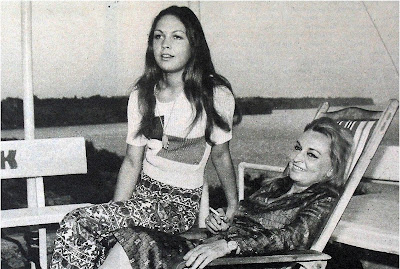 |
| All Grown Up |
I don't know if the mother and daughter acting team of Lale Oraloğlu and Alev Oraloğlu ever made another film together, but they appeared in several productions at Istanbul's Oraloğlu Theater. Lale Oraloğlu, who passed away in 2007 at 82, had a long and distinguished career in virtually every facet of TV, film, and theater…in front of and behind the scenes. Kötü Tohum was Alev Oraloğlu's first leading role in a movie. Following in her mother’s footsteps, she continues to act in television, film, and theater today.


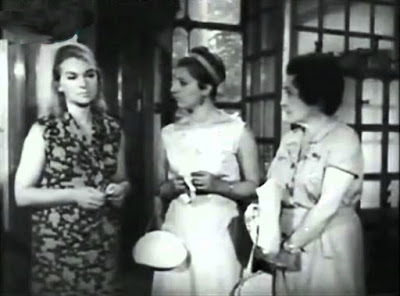
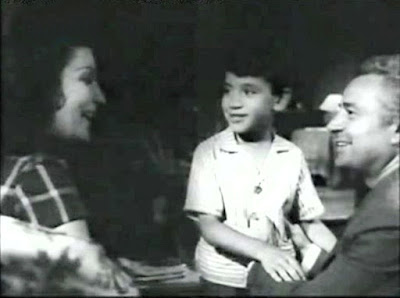
.JPG)
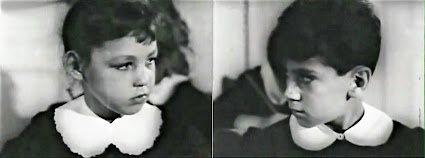
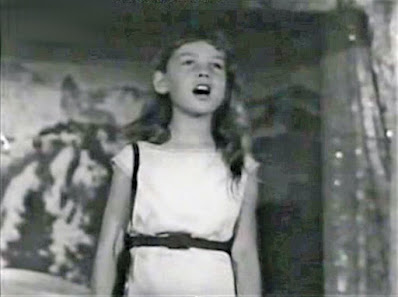
.JPG)